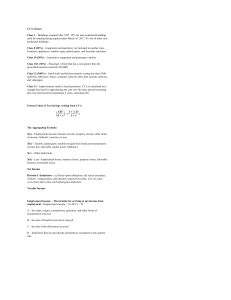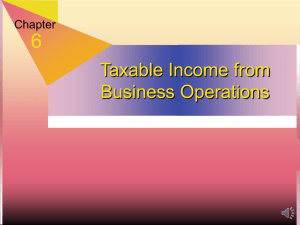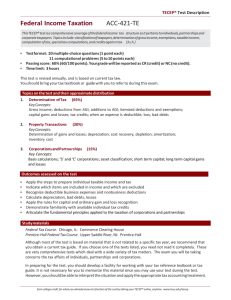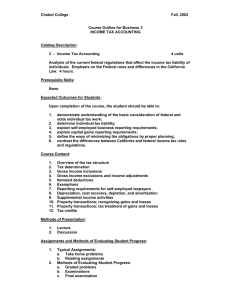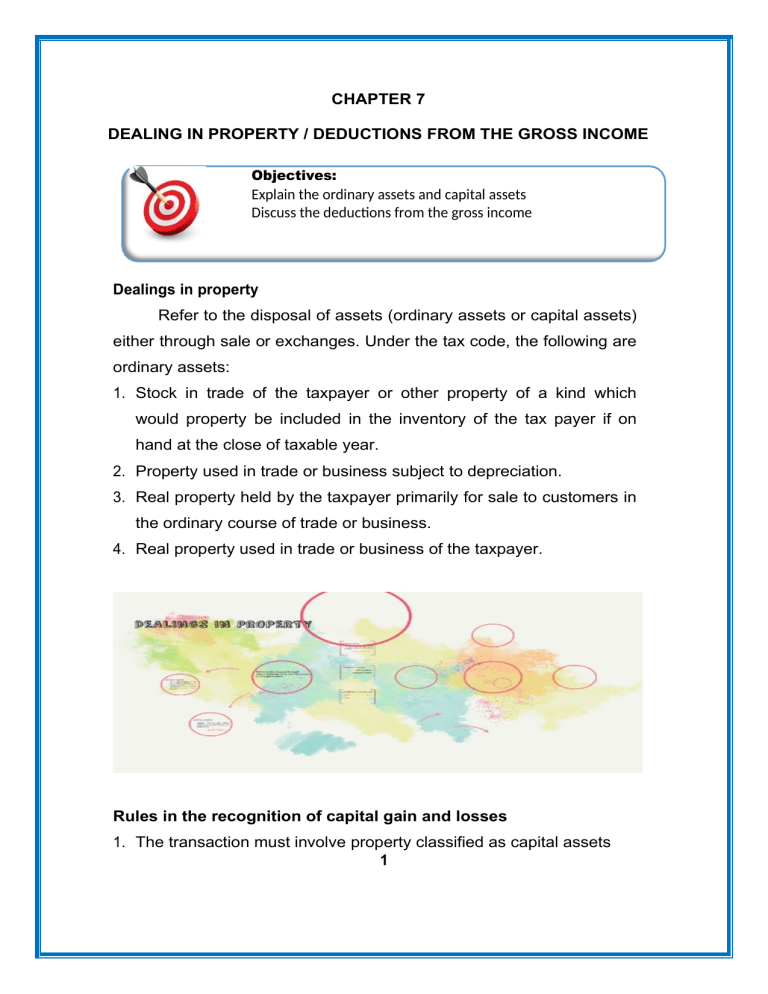
CHAPTER 7 DEALING IN PROPERTY / DEDUCTIONS FROM THE GROSS INCOME Objectives: Explain the ordinary assets and capital assets Discuss the deductions from the gross income Dealings in property Refer to the disposal of assets (ordinary assets or capital assets) either through sale or exchanges. Under the tax code, the following are ordinary assets: 1. Stock in trade of the taxpayer or other property of a kind which would property be included in the inventory of the tax payer if on hand at the close of taxable year. 2. Property used in trade or business subject to depreciation. 3. Real property held by the taxpayer primarily for sale to customers in the ordinary course of trade or business. 4. Real property used in trade or business of the taxpayer. Rules in the recognition of capital gain and losses 1. The transaction must involve property classified as capital assets 1 2. The transaction must arise, generally, from sale or exchange. 3. Net capital gains are added to ordinary gains. 4. Holding period 5. Net capital loss carry-over Capital gains subject to percentage taxes Beginning January 1, 2018, a percentage tax of 6/10 of 1% of the gross selling price or gross value in money of shares of stock sold, bartered, or exchanged through the local stock exchange (Listed Shares) also known as stock transaction tax. The following sellers or transferors of stock are liable to this tax: a. Individual taxpayer, whether citizen or alien. b. Corporate taxpayer, whether domestic or foreign. c. Other taxpayers not falling under (a) and (b) above, such as estate, trust, trust funds, and pension funds, among others. Percentage tax on sale of shares of stock sold or exchanged through initial public offering (IPO) based on the gross selling price or gross value in money of the shares of stock sold in accordance with the proportion of the shares of stock sold to the total outstanding shares of stock after listing in the local stock exchange. Rate/Proportion Percentage tax Up to 25% 4% Over 25% but not over 33 1/3% 2% Over 33 1/3 1% Ratio is computed as: Shares sold, bartered, exchange = Proportion of disposed shares Total outstanding shares to outstanding shares 2 Capital gains subject to capital gains tax a. Capital gains tax on sale of shares of stock of a domestic corporation sold directly to a buyer computed a tax rate of: Beginning January 1, 2018 or upon effectivity of TRAIN LAW - - For individual taxpayers and domestic corporations Tax %: 15% Basis: Capital gains For foreign corporations 5% on 1st P100,000 capital gain Tax %: 15% in excess of P100,000 capital gain Basis: Capital gains b. Capital gains tax on sale of real properties held as capital assets situated in the Philippines computed at a rate of 6% of the highest amount among the selling price, fair market value and zonal value. - Not applicable to foreign corporations. - Refer to Chapter 2 (Individual Taxpayers) discussions and illustrations on capital gains tax. DEDUCTIONS FROM THE GROSS INCOME 3 for detailed Deductions in General 1. For individuals earning purely compensation income. Prior to effectivity of RA 10963-TRAIN Law only a. Premium payments on health and/or hospitalization insurance b. Personal exemptions i. Basic exemptions ii. Additional exemptions Upon effectivity of RA 10963-TRAIN Law (beginning Jan. 1, 2018) i. No more deductions allowed 2. For individuals with gross income from business, trade or practice of professions or mixed income Prior to effectivity of RA 10963-TRAIN Law only a. Premium payments on health and/or hospitalization insurance b. Personal exemptions i. Basic exemptions ii. Additional exemptions c. Itemized deductions or optional standard deductions Upon effectivity of RA 10963-TRAIN Law (beginning Jan. 1, 2018) a. Itemized deductions or optional standard deductions only 3. For corporations and taxable partnerships a. Itemized deductions or optional standard deductions b. Special deductions for i. Insurance companies ii. Mutual insurance companies iii. Mutual marine insurance companies iv. Assessment insurance companies 4. Estates and Trusts a. Personal of P20,000 (prior to effectivity of RA 10963 only) b. Itemized deductions (same deductions with individual taxpayers) 4 c. Special deductions on income of the estate/trust distributed to the heirs/beneficiaries. Exclusions vs. Deductions Exclusions from gross income refer to a flow of wealth to the taxpayer that are not treated as part of gross income, for purposes of computing the taxpayer’s taxable income, due to the following reasons: 1. It is exempted by the fundamental law or statute such as: - De minimis benefits - Employer’s share in SSS, GSIS, Pag-ibig and Philhealth - Interests income from long-term investments - Inter-corporate dividends 2. It does not come within the definition of income such as: - Proceeds of life insurance upon the death of the insured - Stock dividend - Temporary increase in the fair market value of debt and equity investments Deductions from the gross income (Section 34-NIRC) 1. Ordinary and necessary trade, business or professional expenses 2. Taxes 3. Interest 4. Losses 5. Bad debts 6. Depreciations 7. Depletion of oil and gas wells and mines 8. Charitable and other contributions 9. Research and development 10. Pension trusts 5 11. Premium payments on health and/or hospitalization insurance of an individual taxpayer (prior to TRAIN Law) Examples of ordinary and necessary expenses 1. Salaries, wages, allowances and other forms of compensation. RA 9994 – Expanded senior citizens act of 2010: (RR 7-2010) Additional compensation expense Private establishments employing senior citizens shall be entitled to additional deduction from their gross income equivalent to 15% of total amount paid as salaries and wages to senior citizens provided: - The employment shall have to continue for a period of at least six (6) months - The annual taxable income of the senior citizen (s) does not exceed the poverty level as may be determined by the NEDA. RA 7277 – Magna Carta for disabled persons (PWD’s) Private entities that employ disabled persons who meet the required skills or qualifications, either as regular employee, apprentice 6 or learner, shall be entitled to an additional deduction from their gross income equivalent to 25% of the total amount paid as salaries and wages to disabled persons. 2. Travel expenses in the pursuit of trade, business or profession, Requisites: - Reasonable - Incurred or paid while away from home, within and without the country - Incurred or paid in the pursuit of trade, business, profession - Excluded: Personal travels sponsored by the employer subject to FBT. 3. Rentals and/or other payments Requisites - Reasonable and for the purpose of trade, business or profession. - Taxpayers has not taken or is not taking title to or in which he 7 has no equity other that of the lessee, user, or professor 4. Entertainment, amusement and recreation expenses. For seller of both goods or properties and services, an apportionment formula is used in determining the ceiling on such expenses based on the following apportionment formula: Net sales/Revenue x Actual expense ----------------------------Total Net Sales/Revenue Requisites: a. Must be paid or incurred during the year b. Must be directly connected to trade, business or profession or that are directly related to or in furtherance of the conduct of his or its trade, business or exercise of a profession. c. Must not be contrary to law, moral public policy or public order d. It must not have been paid, directly or indirectly, to an official or employee, if it constitutes bribe, kickback, or other similar payments. e. It must be duly substantiated by adequate proof. f. The appropriate withholding tax, if applicable, should have been withheld therefrom and paid to the Bureau of Internal Revenue. Interest for unpaid taxes Interest paid or accrued on taxes related to business of practice of profession, such as those paid for deficiency or delinquency (since taxes are considered indebtedness) are deductible as interest expense, provided that, the tax is a deductible tax. It is deductible in full. 8 Prepaid interest Prepaid interest of an individual under cash basis is deductible not in the year that the interest was paid in advance but in the year that the indebtedness was fully paid. Nondeductible interest and losses (related taxpayers) Interest expenses as well as losses are not allowed as a deduction from the gross income if both the taxpayer and the person to whom the payment has been made or is to be made are: a. Between members of the family b. Except in case of distributions in liquidation, between an individual and corporation more than fifty percent (50%) in value of the outstanding stock of which is owned. c. Except in case of distributions in liquidation, between two corporations more than fifty percent (50%) in value of the outstanding stock of which is owned. d. Between the grantor and a fiduciary of any trust e. Between the fiduciary of a trust and the fiduciary of another trust if the same person is a grantor with respect to each trust. f. Between a fiduciary of a trust and beneficiary of such trust Losses Losses may be offset against all income and capital gains in the same tax year. However, losses are deductible from gross income only on the following ground: a. Ordinary losses arising from losses incurred in trade, business, or profession including net operating loss carry-over b. Casualty losses – the loss is of property connected with trade, 9 business, or profession arising from fire, storm, shipwreck or other casualty, or from robbery, theft, or embezzlement, and for which a declaration of loss was filed with the BIR within 45 days from the date the loss was incurred. Measurement of casualty 1. Total loss – actual loss is the book value of the asset. 2. Partial loss – book value or cost to restore the asset to its normal operating condition, whichever is lower. Net operating loss carry-over (NOLCO) Net operating losses of the business or enterprise for any taxable year immediately preceding the current taxable year, which had not been previously offset as deduction from gross income shall be carried over as a deduction from the gross income for the next three (3) consecutive taxable years immediately following the year of such loss. Taxpayers not allowed to claim NOLCO a. Taxpayers who are exempt from income tax (either by provisions of the NIRC or special laws(s)) at the time the net operating loss was incurred. b. Offshore banking units of a foreign banking corporation and foreign currency deposit unit of a domestic or foreign banking corporation, duly authorized as such by the Bangko Sentral ng Pilipinas. c. Entities registered with the Bureau of Investments (BPI) enjoying income tax holiday with respect to the net operating losses incurred or sustained during the period of such income tax holiday. d. Entities registered with the Philippine Economic Zone Authority (PEZA). 10 e. Enterprises registered under RA 7227 (Bases Conversion Development Act) f. Foreign corporations engaged in international shipping or air carriage in the Philippines. Capital Loss Capital losses are losses from capital assets other than those subjected to capital gains tax. Capital losses are deductible only to the extent of capital gains as discussed in Chapter 8. Hence, if capital loss is higher than capital gains, the net capital loss shall not be considered in the determination of the taxable gross income of the taxpayer Special types of capital losses 1. Wash sales – in the case of any losses claimed to have been sustained from any sale or other disposition of shares of stock, securities or stock options, where it appears that, within a period beginning thirty days before the date of such sale or disposition, and ending thirty days after such date (also known as 61 day period), the taxpayer has acquired, or has entered into a contract. 2. Sort sales – sale of stocks which the seller does not own (he merely borrows the stock certificate through or from his stock broker) and subsequently buys or covers the stock to complete the transaction, thereby postponing the delivery to a later date. 3. Securities becoming worthless; shrinkage in the value of stocks – if the stocks of the corporation become worthless, the cost or other basis may be deducted by the owner in the taxable year in which the stocks become worthless. 4. Wagering losses – losses from wagering transactions shall be allowed only to the extent of the gains from such transactions. 11 5. Loss on merger or consolidation – in a merger or consolidation involving an exchange of stock solely for stock, or security solely for security or stock, no loss is recognized. Other types of losses - Losses due to voluntary removal or building incident to renewal or replacements – deductible expense from gross income - Loss of useful value of capital assets due to charges in business conditions – deductible expense only to the extent of actual loss sustained - Abandonment losses in petroleum operations - Losses arising from a failure to exercise an option money to buy a capital property shall be treated by the buyer as a capital loss. Nondeductible losses - Losses not incurred in trade, profession or business or in any transaction entered into for profit - Losses from sales or exchanges of property entered into between related taxpayers - Losses from exchanges of property in a corporate re-adjustments - Losses from illegal transactions - Loss on voluntary removal of building on land purchased with a view to erect another building. Bayanihan to heal as one act (RA 11469) Under RA 11469, otherwise known as the Bayanihan to heal as one act, a state of national emergency had been declared over the entire country. Furthermore, paragraph 4(o) of the same law granted the President of the Philippines to adopt temporary measures as 12 immediate response to the crisis brought by the COVID-19 pandemic. Section3 of RR 6-2020, further expanded under 9-2020, implementing RA 11469 provides, that the donation of the following items, when made during the period of state of national emergency, for the sole and exclusive purpose of combating COVID-19, shall be considered FULLY DEDUCTIBLE against the gross income of the donor-Corporation/donor-Individual: a. Cash donations b. Critical or needed healthcare equipment or supplies intended to combat the COVID-19 public health emergency c. Materials needed to make health equipment and supplies deemed as critical or needed to address the current public health emergency d. Relief goods, such as but not limited to, food packs (rice, canned goods, noodles, etc.) and water e. Use of property, whether real or personal (shuttle service, use of lots/building) 13 For further discussion please refer to the link provided: Dealings in Property https://www.youtube.com/watch?v=PAtahKYTKeI For further discussion please refer to the link provided: Exclusions of Gross Income https://www.youtube.com/watch?v=FCiR6y9ucDA For further discussion please refer to the link provided: Itemized Deductions https://www.youtube.com/watch?v=NWkKtioE7M0 For further discussion please refer to the link provided: Bayanihan Act 1 (RA 11469) https://www.youtube.com/watch?v=1jKGSd90sFk Reference Book: Income Taxation (with special topics and properly filled BIR forms) By: Enrico D. Tabag, 2020 Edition 14
